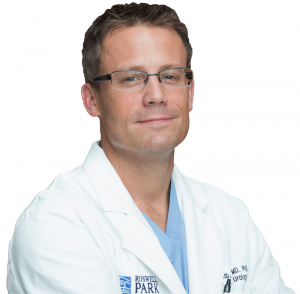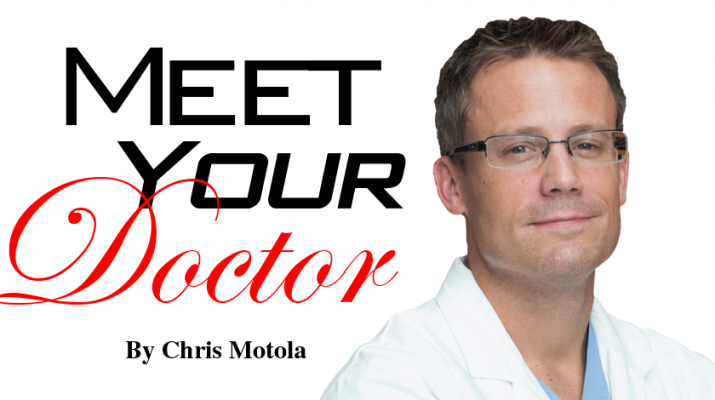Roswell Park chief of strategy, business development and outreach is working to expand Roswell’s cancer-related services to the entire state of New York and beyond
By Chris Motola

Q: You’re responsible for developing strategy for Roswell Park Cancer Network?
A: Yes, I’m the chief of strategy, business development and outreach at Roswell.
Q: Can you give us an overview of what the network is and what it’s trying to accomplish?
A: The Roswell Park Care Network spans the entire state of New York, from Western New York and Buffalo to the Catholic Health Services of Long Island. Our goal is to provide as much quality comprehensive services as you’d get if you walked into our downtown Buffalo campus, and have all of those services available throughout the state. And obviously patients benefit from that tremendously.
Q: What are the challenges of coordinating a network with such a wide geographical distribution?
A: The distance is the greatest challenge, but it’s also the greatest opportunity for our patients. Take our affiliate in Oneida, just outside of Syracuse. Modern oncology care really consists of multiple services that have to be carefully orchestrated. The three mainstays are: surgical services, ideally a subspecialized surgeon that focuses on certain cancers, you need a medical oncologist and you need a treatment center with a radiation oncologist. But you also need the ancillary services that make Roswell Park an NCI [National Cancer Institute] designated cancer center. That includes access to clinical trials, access to pathologists, interventional radiologists and care coordination of different services. So, to pull this all together, you need to be able to control the quality of services that are provided, and we do that in a number of ways. For example, on the medical oncology side, we have input into the physicians who provide care. The long-term goal is that all of our affiliates will follow our oncology pathways, which is essentially embedded into the electronic medical records and helps us ensure that they’re following our quality standards. And it allows us to audit our quality standards and make sure they’re actually helping patients. It allows us to enroll patients in clinical trials if they’d benefit from it. Our radiation oncology team in Buffalo supervises all of the radiation treatment plans in the network even if they don’t walk into our downtown campus. We have access to telemedicine, so if any physician in our remote network needs advice, they can talk to us and even provide telemedicine consults. Technology has really made a big difference.
Q: With reimbursement moving toward outcome-based models, does this help smaller providers in the network meet the standards better?
A: Ultimately I think that’s the goal, to elevate the quality of care in the areas that we can impact. Patients benefit, health systems benefit, patients are taken care of better, and more cost efficiently.
Q: Do you have input into who becomes a member, or reaching out to potential new members?
A: In general, Roswell is interested and willing to partner with anyone interested in providing the highest quality care of cancer services to their patients. There are certain quality metrics that we look to but also, like any other business, certain interpersonal relationships. If you have a good interpersonal relationship between the teams, it’s easier to cooperate and set up the network. The physicians who provide care in the network need to be willing to be audited and educated, and that’s not always an easy conversation to have with the physicians. So, it’s all about the quality and the cooperation.
Q: A big cliché in New York is the Upstate/Downstate divide, viewed almost as two separate states. Do you see that an obstacle to operating in both regions given the differences in population density, demographics, resources, etc.?
A: That’s a good question. I think the challenges are different. Downstate you have a huge population with lots of competing healthcare services. Upstate you only have one NCI-designated cancer center, and that’s us. So we have a very good relationship with the governor, and the governor expects us to follow our vision, and that’s to reach as many patients with our services as possible. We do have to cover a lot more ground than a center based in New York City, for instance, but I think everyone is striving to do the best for their patients.
Q: Do you see the network expanding over state lines to Pennsylvania or Ohio, or do differences in regulations make that impractical?
A: So, in theory and concept, absolutely. We could include not only interstate partners, but international partners. Having said that, there are regulatory pieces to that — for example, making sure physicians working with patients in that state are licensed in that state and that kind of thing. It’s not like we’d be the first to do this.
Q: What’s the next step for the network?
A: Our next step is to solidify services we provide. If you drill down, you’ll find that, in Niagara Falls for example, we’re only providing thoracic surgery services. But the goals is that these multidisciplinary services are delivered at all over our affiliates. So, we want to solidify those relationships and open those services at as many sites as possible that way.
Q: How does your own practice factor in?
A: I’m a urologist who specializes in kidney cancer. I was in private practice, so a lot of our conversations with our affiliate partners are natural to me because I know what our partners are looking for, particularly physicians who are in private practice in a rural area. I think that makes it a bit easier for me to communicate with them. But I still see patients, which is important to maintain credibility.
Lifelines
Name: Thomas Schwaab M.D., Ph.D.
Position: Chief of strategy, business development and outreach at Roswell Park Comprehensive Cancer Center; professor of oncology and immunology
Hometown: Hamm, Germany
Education: MD and Ph.D. from Hannover Medical School
Residency: Klinikum Lippe-Detmold, Detmold, Germany; Dartmouth-Hitchcock Medical Center, Lebanon, New Hampshire.
Fellowship: Tumor immunotherapy program, Dartmouth College, Hanover, New Hampshire
Affiliations: Roswell Park Comprehensive Cancer Center; Catholic Healthcare System
Organizations: American Urological Association; Society of Urologic Oncology; Association of Healthcare Executive
Family: Wife, four children
Hobbies: Soccer

